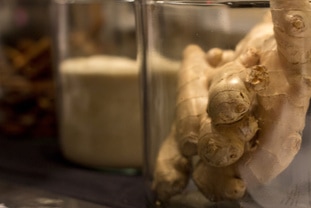 Traditional Chinese Medicine views things differently than other medical systems. In TCM, there are guidelines that are considered very logical when it comes to the seasons. These guidelines lay out what foods and activities are best for each season of the year. Chinese medicine teaches us to live in harmony with the seasons. In TCM, there are actually five seasons – summer, late summer, fall, winter and spring. Every season has many associations which help guide people to create a more balanced life. When TCM was being developed, people lived in harmony with nature and they lived healthy, balanced lives. In modern society, we have gotten away from our connection with nature and we have many more distractions that have ultimately led us to become unbalanced and unhealthy. Winter represents the most yin aspect of Chinese medicine. The properties associated with yin include darkness, cold, slow movement and inward energy. Winter is associated with the kidneys in TCM. The kidneys hold the body’s fundamental energy or Qi. By balancing ourselves with the corresponding seasons, we can prevent disease and stay healthy. So for the season of winter, we should take note of what happens in nature and do the same. To keep the kidneys strong, we must rest. This is why many animals hibernate during the winter. It is also a time to reflect inward and perform activities such as meditation, tai chi and qigong. These are the kinds of practices that help us connect with our inner selves and also support kidney energy. When it comes to foods most beneficial for the body during the winter months, there are many to choose from. These should also be ones that naturally grow during this season. Items such as squash, potatoes, pumpkin, sweet potato, cinnamon, nutmeg, cardamom, beets, greens, carrots, mushrooms, apples, pears and cabbage. During the winter months, cold foods like salads and raw foods should be avoided as they will deplete the immune system. Instead, our bodies need warming foods like soups made with hearty vegetables. Bone broth is also very beneficial and becoming more mainstream. There are also foods that specifically target and nourish the kidneys. These include kidney beans, beef, goose, duck, black beans, lamb, chicken, dark leafy greens, garlic, ginger, walnuts, watercress and turnips. Sea salt is also helpful. Salty is the taste associated with the kidneys. But as with anything, moderation is key. Too much salt can actually tax the heart, which then causes the kidneys to work overtime. You should cook for longer periods of time and on low heat with less water, so things like stews are perfect for this time of year. The longer cooking times will infuse the foods with more heat, which will help keep the body warm. It is recommended to bake, roast, stew and slow cook foods in the winter. Hearty soups, roasted nuts and whole grains should be consumed when possible because they offer nourishment that feeds the body as well as the kidneys specifically. By taking cues from nature and ancient healing practices, better balance can be achieved and health can be maintained. Those that went before us may not have known everything, but they did know how to survive or we would not be here today. Trusting the teachings of our ancestors will allow us to continue to survive also. Happy Winter Eating! |
AuthorsRebecca M H Kitzerow is a Licensed Acupuncturist practicing in La Center, Washington. With over a decade of experience she has won 10 Nattie consumer choice awards from Natural Awakenings Magazine since 2014. Archives
July 2024
Categories
All
|
Photos from Hey Paul Studios, BeGreen_Studio, Pawel Pacholec, 1950sUnlimited, toulupaliaqaz, Joelk75, OnTask, Robert Gourley, cnu_sports, Mitya Ku, wuestenigel (CC BY 2.0), FootMassagez, 401(K) 2013, Mariana Heinz, @EdwardTerry, fishhawk, liverpoolhls, torbakhopper, Boemski, dolomitibl, Driscolltheque, Dave n Laura, Vaping360, MVWorks, Life Mental Health, MVWorks, mikefats, Scot Nelson, jfl1066, wZa HK, ruurmo, Guadalupe Cervilla, Army Medicine, GViciano, torbakhopper, adrigu, Saulo Cruz, Ben Cumming, marniejoyce, kcxd, JasonCorey, kanenas.net, Live to Create Photography, gm.esthermax, Unique Hotels Group, Zenspa1, mysiana, Tobias Lindman, Leader Nancy Pelosi, Kristoffer Trolle, swanksalot, Bill Selak, Parker Knight, stimpsonjake, Gedankensprudler, SuperFantastic, tonynetone, marniejoyce, JeepersMedia, Illusive Photography, 'Ajnagraphy', Iban Torras, scotted400, gtall1, dvanzuijlekom, BPPrice, Skley, torbakhopper, Renato Ganoza, anka.albrecht, QUOI Media, Public Domain Photos, Instant Vantage, Victor Tongdee, Free Grunge Textures - www.freestock.ca, sportEX journals, Nadja Tatar, angela n., marniejoyce, MVWorks, Karolina Kabat, Thomas Fisher Rare Book Library, UofT, ginnerobot, tracilawson, haven't the slightest, My Photo Journeys, Pierre Willemin, Florena_Presse, SuperFantastic, colindunn, zzkt, TraumaAndDissociation, ER24 EMS (Pty) Ltd., shixart1985 (CC BY 2.0), marniejoyce, Tomás Fano, freestock.ca ♡ dare to share beauty, Archives New Zealand, Jaykhuang, airdrie.m, Go-tea 郭天, OnTask, wuestenigel, focusonmore.com, Disney | ABC Television Group, Andrew Gustar, Didriks, ConstructionDealMkting, charlywkarl, barnimages.com, Lel4nd, runwaypilates, michaelstephanfotografie, McLevn, TraumaAndDissociation, eLife - the journal, Lars Plougmann, wuestenigel, shixart1985, boviate, davis.steve32, kevin dooley, @the.photoguy (insta), frederic.gombert, Feathering the Nest, Victor Tondee, shixart1985, wuestenigel, Joe K Gage, kennethkonica
 RSS Feed
RSS Feed
